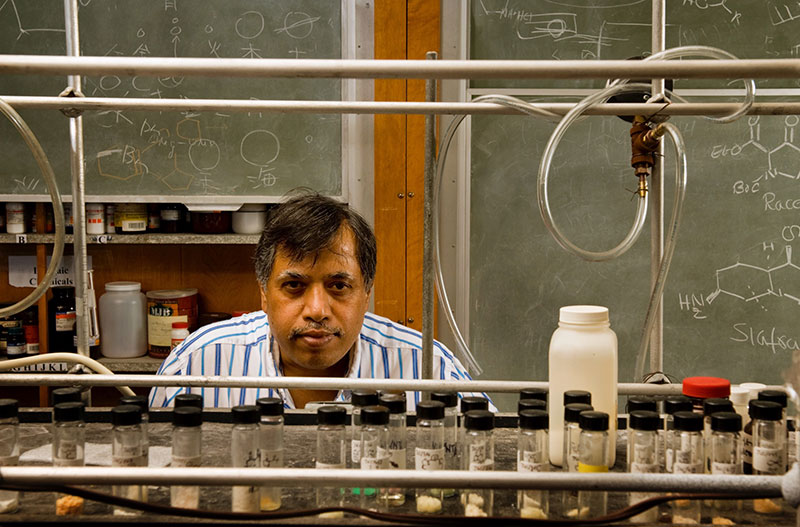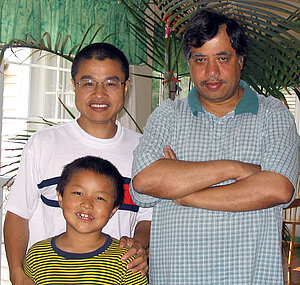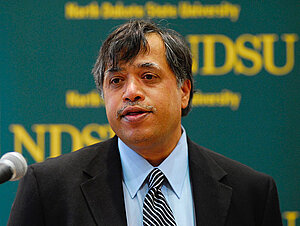A career guided by serendipity and kindness

How has the concept of “kindness” driven NDSU’s biomedical research enterprise at NDSU for the past four decades? Mukund Sibi, university distinguished professor of chemistry and biochemistry joined NDSU as an assistant professor in 1987 and in 2021, was among an exclusive group of only 564 researchers in the world named as an American Association for the Advancement of Science (AAAS) fellow in 2021.
Originally from Bangalore, India, Sibi has two sisters and two brothers and his parents came from an agricultural family. The siblings grew up together during the 1960s, a time when India suffered under harsh conditions brought on by drought. After receiving his bachelor's and master's degrees from Bangalore University, Sibi enrolled at City University of New York in 1975 and began work on his PhD in chemistry.
Living far from home was a challenge for the young scholar but his belief in serendipity was only strengthened when he started a lifelong friendship with a fellow graduate student couple in New York. Students themselves, they knew the types of challenges he would face in this point of his education and they helped him successfully navigate that aspect of his life along with the challenges of living in an entirely new city and culture. The three formed a friendship that would last for decades. The kindness they showed him helped Sibi develop his philosophy of working with people and it had an impact on the type of educator and researcher he would later become. “The kindness of people has a profound impact on your own kindness,” he firmly states.
In addition, Sibi’s upbringing in India was the groundwork for his later success. His father modeled how learning can be a way forward to a better life. He taught himself to type in English as part of his career as a stenographer for a sugar company. Conditions for the family were not always financially sound and his parents knew that obtaining an education was critical to their children’s future success. They instilled a belief in the power of education with Sibi and his siblings and it resounded with them: All five attended college and became successful in a variety of disciplines including chemistry, book translation, brewing, electronic engineering, education and philanthropy.
While all of his family remained in India, Sibi found himself on a different path. From early on he was enthralled with the western music he heard on Radio Kuwait late at night and decided that he would be the first of his family to attend school outside of India.

After his graduate studies, Sibi’s early career included postdoctoral work at Dartmouth College, the University of Waterloo, and at Florida State. The start of his career at NDSU coincided with an influx of new researchers to the university and the early 1990s would mark a major era in organic chemistry. His research interests include total synthesis of natural products, radical chemistry, chiral catalysis, conversion of biomass to chemicals, and non-food uses of agricultural materials. His research in synthetic organic chemistry focuses on new synthetic methodology, asymmetric synthesis, natural product synthesis and new materials.
A major landmark for Sibi and for NDSU was securing the first Center of Biomedical Research Excellence (COBRE) from prestigious National Institutes of Health funding in 2000. Still in operation today, the Center had nearly 30 faculty investigators from four different NDSU colleges. Two central Core Facilities in biology and synthesis established by the Center have had a significant impact on research programs in the university and throughout North Dakota and the Center conducts several outreach activities such as workshops for North Dakota University System faculty and students as well as a summer research program for undergraduates.
During the last 20 years, the Center for Protease Research has examined the role of proteases (enzymes) on several diseases including cancer, arthritis, autoimmune diseases, diabetes, and asthma.
While COBREs contribute scientifically, they also build human capacity in the sciences and Sibi’s career is a testament to both. In the commendation from AAAS in recognition of being named a fellow, Sibi was honored for “pioneering work in enantioselective radical reactions and asymmetric synthesis and building biomedical research infrastructure through effective leadership and mentoring.” Over the lifetime of his career, Sibi has mentored more than 300 undergraduate, 70 graduate, and 14 high school students in addition to 68 post-docs.

One special example of a postdoctoral researcher at NDSU in the early 1990s shows how intertwined research and mentoring are for Sibi. Even though University of Michigan chemistry professor Moses Gomberg had initially discovered organic free radicals in 1900, it took another 50 years before other chemists realized they could be used to create synthetic materials like rubber and plastics. Then it took another 40 years until researchers like Sibi began looking into how they could be used to create carbon-carbon bond selectively. Sibi found an exciting new world of possibilities in organic radicals. It was at this time that he also formed an early partnership with a young postdoctoral researcher named Ji Jianguo.
Today a respected research scientist at AbbVie, Jianguo remembers when he joined Sibi’s lab as a young postdoc to work on converting sunflower oil into a nylon polymer. “One day Muk walked into the lab and asked me if I thought we could achieve enantio- or diastereo- selectivity for a radical reaction. Then, with a big smile, he answered his own question, saying ‘I think we can and here is how to make it happen!’”
This was Jianguo’s first experience in radical chemistry and he was hooked. “The idea was so unique and ingenious, I was immediately amazed by the idea and asked for the opportunity to work in this creative field.”
Jianguo had found a mentor in Sibi. Much like his own postdoc experience at Waterloo, Sibi helped Jianguo grow in ways outside of the research. “When I joined his lab, I barely spoke English,” he recalls. “He taught me the importance of spoken English and helped improve my speaking skills by inviting me to communicate chemistry ideas and results with students and faculty during Friday evening social events. Soon my English quickly improved, and I give Muk much credit for my success in early job interviews and in my later career development.”
As the research pieces began to fall into place, serendipitously, Sibi was also successful in obtaining grant funding. After receiving his first NIH R01 award, he began to receive invitations from across the globe to speak about his work which resulted in even more connections. Sibi figures he was responsible for 10% of all NIH funding in the state of North Dakota during the 1990’s.

Sibi’s research reputation blossomed during the middle 1990s. He received tenure and earned his first patent for the development of an amino acid. “In my science, things started falling into place,” he remembers. “During 1993-1997, the discoveries were spectacular.” These efforts were recognized by the American Chemical Society. Sibi was awarded the prestigious Arthur C. Cope Scholar award in 2008.
Throughout it all, Sibi has continued mentoring. “I’ve had spectacular undergraduate and graduate students,” he said. “My students make the program.” Much like with Jianguo, Sibi takes pride in the fact that his students typically have a variety of job offers by the time they graduate.
Sibi’s mentorship extends beyond students and postdoctoral fellows. After earning tenure, Sibi realized that the best way to grow NDSU was to help his peers also grow in their careers, Sibi believes that collectivism is important and relationships are key. “I’m in the right job as a professor because I truly like to build leadership skills in others.” A saying often attributed to Sibi is, “We don’t grow unless we all grow.”
This message is clear to other researchers at NDSU who have benefited from Sibi’s time with them. Jane Schuh, NDSU microbiology professor and director of special initiatives in agricultural affairs, worked with him early in her career. “Muk Sibi is one of the best mentors, scientists, and human beings that I have ever known,” she said. “His vision, hard work, and selfless dedication to building biomedical research at NDSU--of note, this is an area that is not his field and for which he received little professional return--was the foundation for many, many successful careers including mine. He's one of the good guys, and he is my hero.”
Sibi’s reputation gave him a unique viewpoint that others relied upon in making big decisions. He recalls a conversation with past NDSU President Joe Chapman about an opportunity Sibi had to move to Arizona. “He asked me, ‘how can I keep you here?’ and I told him simply to improve our lab space.”
This was the early groundwork for the state-of-the-art NDSU Sugihara facility which opened in 2021. “We needed space that had better air and had safer labs and we got both in Sugihara. It’s such a great recruiting tool for both researchers and students -- I wish all of my previous students could come back and see it.”
Today Sibi is as busy as ever as he knows he has much left to offer the world of science. When asked what’s next for him, he said, “I’ve found so much to be grateful for over the years, and especially recently, with collaborations both internally and outside NDSU. Life has its own way. I have lots of curiosity I need to follow.”
Sibi still counts working with students among his favorite activities. “Each summer I work with both high school and undergraduate students and help them discover science.” He characterizes his next endeavors consistent with how he has fused that mentorship with science: “I want to continue bringing new ideas and opportunities to campus.”


